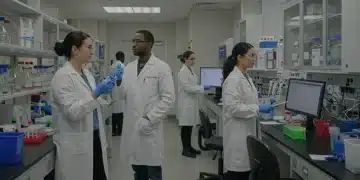Biotech Skills Gap: Top US Job Skills in 2025 & How to Learn Them

The biotech skills gap in the US is widening, creating a demand for specific skills in 2025, including data science, bioinformatics, and biomanufacturing; acquiring these skills through targeted training and education is crucial for career advancement.
The biotech skills gap: Identifying the Most In-Demand Skills for US Jobs in 2025 and How to Acquire Them, is a critical issue impacting the industry’s growth and innovation.
Understanding the Biotech Skills Gap in the US
The biotech industry is rapidly evolving, and with that evolution comes a growing need for specialized skills. The biotech skills gap in the US refers to the discrepancy between the skills employers need and the skills job seekers possess. Understanding this gap is the first step in addressing it.
What Causes the Biotech Skills Gap?
Several factors contribute to the biotech skills gap. These include rapid technological advancements, increased demand for specialized roles, and a shortage of qualified candidates. Educational institutions and training programs are often struggling to keep pace with the industry’s changing needs.
The Impact of the Skills Gap on the Biotech Industry
The skills gap has significant consequences for the biotech industry. Companies may struggle to find qualified employees, leading to delays in research and development, reduced innovation, and decreased competitiveness. Addressing this gap is essential for the industry’s continued growth.
- Technological advancements require new skills.
- Demand for specialists exceeds the supply.
- Educational programs lag behind industry needs.
- The gap hinders innovation and growth.
In conclusion, the biotech skills gap is a complex issue with far-reaching implications. By understanding the causes and impacts of this gap, stakeholders can work together to develop effective solutions that ensure the industry has access to the skilled workforce it needs to thrive.

Top In-Demand Biotech Skills for US Jobs in 2025
As we approach 2025, certain biotech skills are becoming increasingly crucial for success in the US job market. Identifying these top in-demand skills is vital for job seekers and educational institutions alike.
Data Science and Bioinformatics
Data science and bioinformatics are at the forefront of the biotech skills needed. With the increasing volume of biological data, professionals who can analyze and interpret this data are highly sought after.
Genetic Engineering and CRISPR Technology
Genetic engineering and CRISPR technology are transforming the biotech landscape. Expertise in these areas is essential for developing new therapies and improving existing ones.
Biomanufacturing and Process Development
Biomanufacturing and process development are critical for producing biopharmaceuticals at scale. Skills in these areas ensure efficient and cost-effective manufacturing processes.
- Data analysis is crucial for interpreting biological data.
- Genetic engineering expertise is in high demand.
- Biomanufacturing skills ensure efficient production.
- Regulatory knowledge is increasingly important.
In summary, the top in-demand biotech skills for US jobs in 2025 include data science, genetic engineering, and biomanufacturing. Professionals who possess these skills will be well-positioned for success in the evolving biotech job market.
How to Acquire In-Demand Biotech Skills
Acquiring the in-demand biotech skills is essential for those looking to advance their careers in the industry. There are several pathways you can take to gain these skills and stay competitive.
Formal Education and Degree Programs
Formal education, such as bachelor’s and master’s degrees in biotechnology, bioinformatics, or related fields, provides a strong foundation in scientific principles and research methodologies.
Online Courses and Certifications
Online courses and certifications offer a flexible and convenient way to learn specific technical skills. Platforms like Coursera, edX, and Udemy offer a variety of biotech-related courses.
Internships and Hands-On Training
Internships and hands-on training provide invaluable real-world experience. These opportunities allow you to apply your knowledge in a practical setting and learn from industry professionals.
- Formal education provides a strong foundation.
- Online courses offer flexible learning options.
- Internships provide real-world experience.
- Networking helps you stay informed.
In conclusion, acquiring in-demand biotech skills can be achieved through formal education, online courses, and hands-on training. By leveraging these resources, individuals can enhance their skill sets and advance their careers in the biotech industry.
The Role of Educational Institutions in Bridging the Gap
Educational institutions play a pivotal role in bridging the biotech skills gap. By aligning their curriculums with industry needs and providing relevant training opportunities, they can ensure that graduates are well-prepared for the workforce.
Curriculum Development and Updates
Educational institutions must continuously update their curriculums to reflect the latest advancements in biotechnology. This includes incorporating emerging technologies and addressing the skills demands of the industry.
Industry Partnerships and Collaboration
Collaborating with industry partners allows educational institutions to gain insights into the specific skills employers are looking for. These partnerships can lead to joint research projects, internships, and guest lectures.
Investing in Infrastructure and Resources
Educational institutions need to invest in state-of-the-art infrastructure and resources, such as modern laboratories and advanced equipment. This provides students with hands-on experience and prepares them for the realities of the biotech industry.

- Curriculum updates keep pace with industry changes.
- Industry partnerships provide valuable insights.
- Infrastructure investments enhance learning.
- Faculty training ensures quality education.
In summary, educational institutions can bridge the biotech skills gap by developing relevant curriculums, collaborating with industry partners, and investing in infrastructure. By taking these steps, they can ensure graduates are equipped with the skills needed to succeed in the biotech industry.
Future Trends in the Biotech Job Market
The biotech job market is constantly evolving, driven by technological advancements, regulatory changes, and global health challenges. Understanding these future trends is crucial for job seekers and employers alike.
The Rise of Personalized Medicine
Personalized medicine, which tailors medical treatment to individual characteristics, is gaining prominence. This trend is creating a demand for professionals with expertise in genomics, proteomics, and data analysis.
Increasing Focus on Sustainability and Green Biotechnology
Sustainability and green biotechnology are becoming increasingly important. Companies are seeking professionals who can develop environmentally friendly bioproducts and sustainable manufacturing processes.
The Impact of Artificial Intelligence and Automation
Artificial intelligence and automation are transforming the biotech industry. Professionals who can leverage these technologies to improve efficiency and innovation are in high demand.
- Personalized medicine drives demand for genomics experts.
- Sustainability focuses on green biotechnology.
- AI and automation improve efficiency.
- Remote work opportunities are expanding.
In conclusion, future trends in the biotech job market include the rise of personalized medicine, increasing focus on sustainability, and the impact of AI and automation. Staying informed about these trends is essential for long-term success in the biotech industry.
Strategies for Biotech Companies to Attract and Retain Talent
For biotech companies to thrive, they must be able to attract and retain top talent. This requires implementing effective strategies that create a positive work environment and offer competitive benefits.
Offering Competitive Salaries and Benefits
One of the most effective ways to attract and retain talent is to offer competitive salaries and benefits packages. This includes health insurance, retirement plans, paid time off, and other perks.
Creating a Positive and Inclusive Work Environment
A positive and inclusive work environment is essential for employee satisfaction and retention. Companies should foster a culture of collaboration, respect, and appreciation.
Providing Opportunities for Professional Development
Offering opportunities for professional development, such as training programs, conferences, and mentorship, can help employees grow and advance their careers. This not only benefits the employees but also enhances the company’s capabilities.
- Competitive salaries attract top talent.
- A positive environment boosts retention.
- Professional development helps employees grow.
- Flexible work arrangements improve work-life balance.
In summary, biotech companies can attract and retain talent by offering competitive salaries, creating a positive work environment, and providing opportunities for professional development. These strategies can help companies build a skilled and motivated workforce that drives innovation and growth.
| Key Point | Brief Description |
|---|---|
| 🧬 Data Science | Analyzing biological data to drive research and development. |
| 🧪 Genetic Engineering | Modifying genes to develop new therapies and improve existing ones. |
| 🏭 Biomanufacturing | Producing biopharmaceuticals at scale efficiently and cost-effectively. |
| 🌱 Sustainability | Developing eco-friendly bioproducts and sustainable manufacturing. |
Frequently Asked Questions (FAQ)
▼
The biotech skills gap refers to the mismatch between the skills employers need and the skills that job seekers possess in the biotechnology industry, hindering growth and innovation.
▼
The most in-demand skills include data science, bioinformatics, genetic engineering, biomanufacturing, and regulatory knowledge, all crucial for advancing biotech research and production.
▼
You can acquire these skills through formal education, online courses, certifications, internships, and hands-on training, providing a well-rounded skill set for the biotech industry.
▼
Educational institutions must update curriculums and collaborate with industry to ensure graduates possess skills that align with industry needs, bridging the skills gap effectively.
▼
Future trends include personalized medicine, sustainability, AI integration, and remote work opportunities, making it crucial to adapt skills and knowledge to these emerging areas.
Conclusion
Addressing the biotech skills gap: Identifying the Most In-Demand Skills for US Jobs in 2025 and How to Acquire Them, requires a collaborative effort between educational institutions, companies, and individuals. By staying informed, investing in training, and adapting to industry trends, we can ensure a bright future for the biotech industry in the US.





